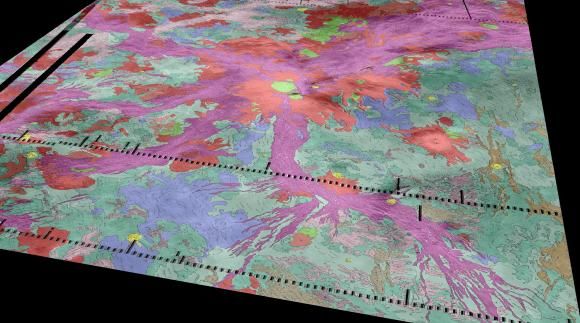Venus (Probably) Has Active Volcanoes
And they’re (probably) erupting!
/https://tf-cmsv2-smithsonianmag-media.s3.amazonaws.com/filer/af/09/af09dd2b-9a1f-4ffe-8250-f5601893a3ef/pia00233-_venus_-_3d_perspective_view_of_eistla_regio_edit.jpg)
Volcanoes aren’t unique to Earth. There’s evidence of ancient volcanic activity on Mars and current activity on Jupiter’s Moon Io. Far from the slopes of Mount Saint Helens (and the fictional plains of Mordor), volcanic activity persists beyond our own planet across the Milky Way.
In a study published June 18 in Geophysical Researcher Letters, geologists report evidence for volcanic eruptions just a few hundred million kilometers away on Venus. Planetary scientists know that volcanoes must have shaped the planet’s surface previously in its history, but this latest study adds to other clues that volcanoes on Venus might still be exploding today, notes Chris Crockett of Science News.
“We were able to show strong evidence that Venus is volcanically, and thus internally, active today. This is a major finding that helps us understand the evolution of planets like our own,” James Head, a geologist at Brown University and one of the study co-authors, said in a statement.
Head and his colleagues were sifting through images from Venus Monitoring Camera, which has been orbiting Venus on the European Space Agency’s Venus Express satellite since 2006, and they noticed a few key temperature spikes visible through the camera’s infrared lens. Over a few days, the bright spots seemed to heat up and cool over a few days. The hotspots are centered along the Ganiki Chasma, a young-ish rift in Venus’ crust that formed with help from older volcanic activity. Because similar volcanic activity can be seen in rift areas on Earth, the researchers think, the spikes in temperature may stem from lava flowing on the planet’s surface.

Head explained: “This discovery fits nicely with the emerging picture of very recent activity in Venus’ geologic history.” Previously, scientists saw upticks sulfur dioxide on the planet’s surface in the 1970s and 1980s as a possible sign of potentially active volcanoes, Crockett writes.
So Earth residents wishing to take a trip to our neighboring planet in the near future had best watch out for local lava flows.
/https://tf-cmsv2-smithsonianmag-media.s3.amazonaws.com/accounts/headshot/Screen_Shot_2014-01-27_at_12.05.16_PM.png)
/https://tf-cmsv2-smithsonianmag-media.s3.amazonaws.com/accounts/headshot/Screen_Shot_2014-01-27_at_12.05.16_PM.png)